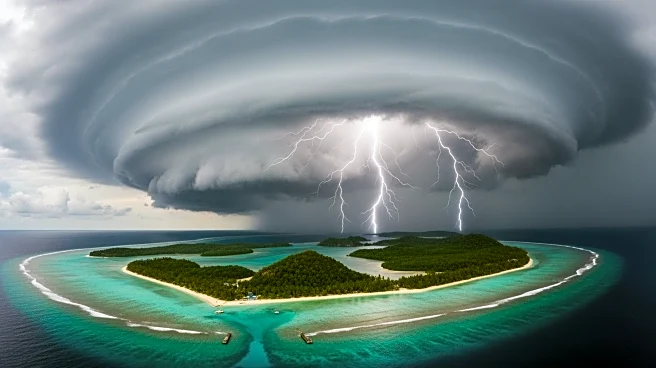What's Happening?
Hurricane Melissa has rapidly intensified into a Category 5 storm, with wind speeds exceeding 157 mph, due to the warming of the Atlantic Ocean. This intensification occurred in less than 24 hours, a phenomenon
linked to climate change, according to climate scientists. The storm is expected to make landfall in Jamaica, then proceed to Cuba and the Bahamas. This marks the fourth Atlantic storm this year to experience such rapid intensification. The U.S. National Hurricane Center has issued warnings of catastrophic flash flooding and landslides in Jamaica, with some areas potentially receiving up to 40 inches of rain. The storm has already resulted in fatalities and significant damage in Haiti and the Dominican Republic.
Why It's Important?
The rapid intensification of storms like Hurricane Melissa underscores the increasing impact of climate change on weather patterns. Warming oceans, driven by greenhouse gas emissions, are making such explosive storm developments more common, posing significant risks to coastal and island communities. The intensification of storms near land increases the threat to lives and infrastructure, necessitating urgent action to mitigate climate change effects. This includes reducing emissions and enhancing coastal defenses. The situation highlights the vulnerability of small island nations and the need for global cooperation to address climate change and its impacts.
What's Next?
As Hurricane Melissa approaches Jamaica, preparations are underway to mitigate its impact. The storm is expected to be the strongest to hit the island since record-keeping began. The urgency for global action on climate change is emphasized by policymakers, particularly from small island states, who are advocating for measures to limit global warming to 1.5 degrees Celsius. The upcoming United Nations climate talks in Brazil will likely address these concerns, with a focus on reducing planet-heating gas emissions and enhancing resilience against extreme weather events.
Beyond the Headlines
The intensification of hurricanes due to climate change raises ethical and policy questions about global responsibility and the need for equitable climate action. Small island nations, which contribute minimally to global emissions, are disproportionately affected by these extreme weather events. This situation calls for increased support from developed nations to help vulnerable countries adapt to climate impacts and build resilience. The ongoing dialogue at international climate forums will be crucial in shaping policies that address these disparities and promote sustainable development.










